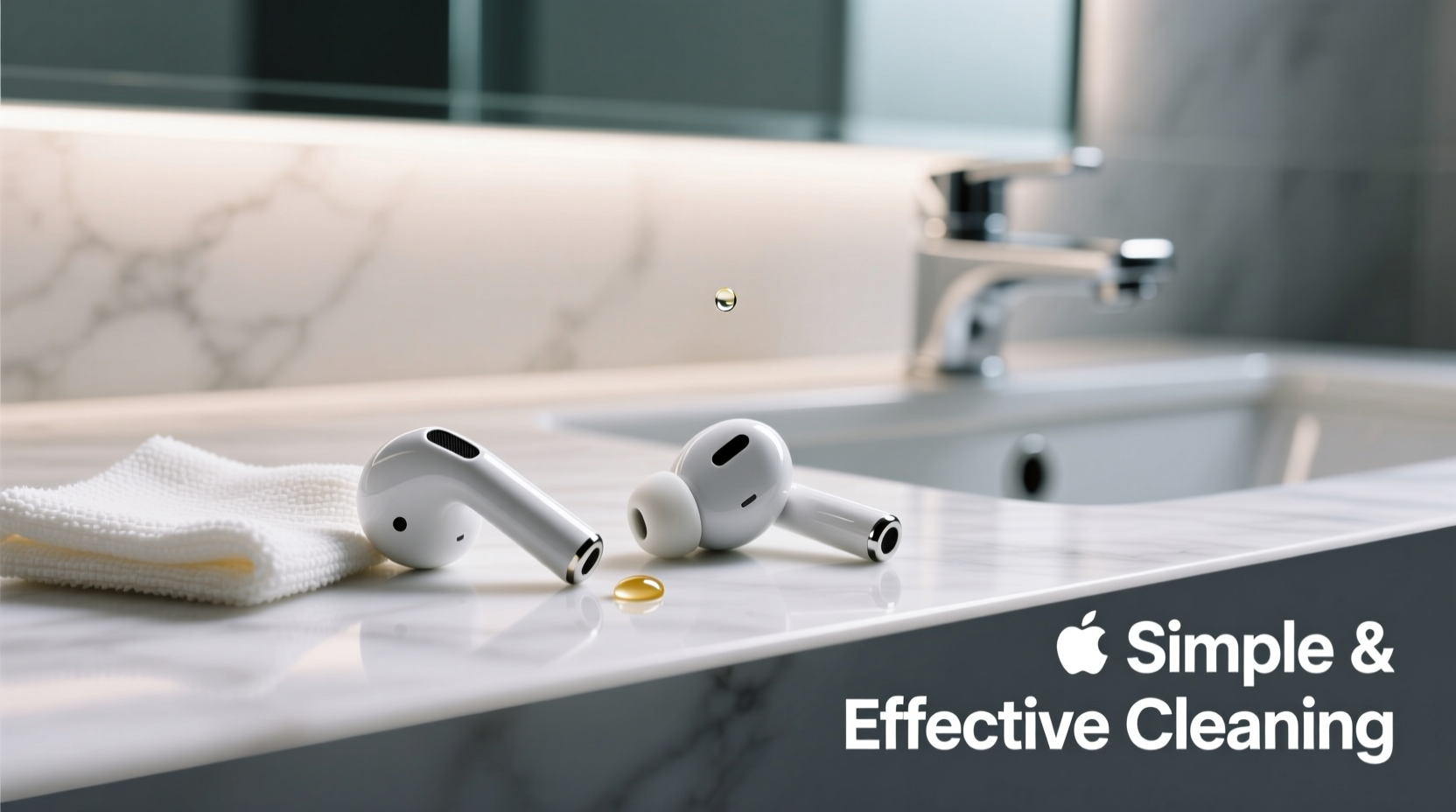Apple AirPods are designed for convenience, comfort, and high-quality audio, but frequent use exposes them to earwax, sweat, dust, and bacteria. Over time, this buildup can affect sound clarity, microphone performance, and even hygiene. Cleaning your AirPods regularly isn’t just about aesthetics—it’s essential for maintaining peak functionality and extending their lifespan. The good news? You don’t need special tools or expensive kits. With everyday household items and a few careful techniques, you can keep your AirPods in pristine condition.
Why Regular Cleaning Matters

AirPods rest directly in or around your ears, making them prone to accumulating oils, dead skin cells, and moisture. According to audiologists, unclean earbuds are a common contributor to ear irritation and minor infections. Beyond health concerns, debris clogging the speaker mesh can muffle audio output and reduce bass response. Microphone ports near the stem can also become obstructed, leading to poor call quality. Regular cleaning ensures consistent audio performance and reduces the risk of long-term damage from trapped moisture or corrosion.
“Earbuds are among the most germ-laden personal devices we own—cleaning them weekly can significantly improve both hygiene and sound fidelity.” — Dr. Lena Torres, Audiologist & Hearing Health Specialist
Step-by-Step Guide to Cleaning Different AirPod Models
Apple produces several AirPod models—AirPods (1st to 3rd gen), AirPods Pro (1st and 2nd gen), and AirPods Max. Each has unique features, but all benefit from gentle, targeted cleaning. Follow this timeline-based approach for optimal results:
- Power Off and Remove from Case: Always disconnect your AirPods from any device and take them out of the charging case before cleaning.
- Dry Wipe Exterior Surfaces: Use a soft, lint-free cloth (like microfiber) to gently wipe the outer shell. Avoid paper towels, which can scratch surfaces.
- Clean Speaker Mesh Gently: For AirPods and AirPods Pro, use a dry cotton swab to lightly sweep across the speaker grille. Do not insert the swab deeply—only remove surface debris.
- Address Ear Tips (AirPods Pro): Detach silicone tips and rinse under lukewarm water. Let them air-dry completely before reattaching. Never use soap unless specified by Apple.
- Tackle the Charging Case: Wipe the exterior with a slightly dampened cloth. Use a dry cotton swab to clean the Lightning port and interior surfaces. Keep moisture away from electronics.
- Wait Before Reuse: Allow all components to dry fully—especially after rinsing ear tips—before placing AirPods back in the case or using them.
Do’s and Don’ts of AirPod Cleaning
Many users unknowingly damage their AirPods during cleaning. The following table outlines safe practices versus common mistakes:
| Do’s | Don’ts |
|---|---|
| Use a dry microfiber cloth for daily wiping | Use alcohol, bleach, or window cleaners |
| Clean ear tips weekly if used daily | Insert sharp objects into speaker mesh |
| Let wet parts air-dry completely before use | Rinse non-Pro models under water |
| Use compressed air sparingly on case crevices | Apply excessive pressure when wiping |
Real Example: How One User Improved Audio Clarity
Mark, a remote worker in Seattle, noticed his AirPods Pro were muffling voices during Zoom calls. Initially, he assumed the issue was software-related and reset his iPhone twice. When the problem persisted, he inspected the microphone grilles and found a thin layer of wax and dust blocking the ports. Using a dry brush from a camera cleaning kit, he gently swept the stems and cleaned the ear tips with water. After drying overnight, the audio returned to normal. “I had no idea how much gunk built up over three weeks of daily use,” Mark said. “Now I clean them every Friday—it takes five minutes and makes a huge difference.”
Essential Cleaning Checklist
Keep this checklist handy for routine maintenance:
- ✅ Power off and remove AirPods from case
- ✅ Wipe exterior with dry microfiber cloth
- ✅ Clean speaker mesh with dry cotton swab
- ✅ Remove and rinse ear tips (Pro models only)
- ✅ Wipe charging case with slightly damp cloth
- ✅ Clear debris from Lightning/USB-C port with dry swab
- ✅ Allow all parts to air-dry completely
- ✅ Reassemble and test audio quality
Frequently Asked Questions
Can I use disinfectant wipes on my AirPods?
No. Apple advises against using disinfectants, including Clorox or alcohol wipes, as they can degrade the oleophobic coating on AirPods Pro and damage plastic finishes. A slightly damp microfiber cloth is safer for occasional disinfection.
How often should I clean my AirPods?
If used daily, clean the ear tips and exteriors weekly. Perform a deeper clean—including mesh and case ports—every two weeks. Occasional users can clean monthly.
Why does my AirPod sound muffled after cleaning?
This may happen if moisture remains trapped inside. Ensure all components are completely dry before use. If the issue persists, check that no fibers from cloths or swabs are lodged in the speaker mesh.
Maintaining Long-Term Performance
Cleaning is only one part of AirPod care. To maximize longevity, store them in their case when not in use, avoid extreme temperatures, and keep them away from humid environments like bathrooms. For AirPods Pro users, consider rotating multiple sets of ear tips to allow thorough drying between uses. Additionally, updating firmware regularly can help maintain sensor accuracy and noise-canceling efficiency, complementing physical maintenance.
Consistent care pays off. Users who follow a simple cleaning routine report clearer audio, fewer connectivity issues, and longer device lifespans—often exceeding three years of reliable service.
Conclusion
Cleaning your Apple AirPods doesn’t require complicated tools or expertise. With a few minutes each week and the right technique, you can preserve sound quality, enhance hygiene, and protect your investment. Whether you're using standard AirPods or premium Pro models, these simple steps ensure your earbuds perform at their best. Make cleaning a seamless part of your tech routine—your ears and your audio will thank you.









 浙公网安备
33010002000092号
浙公网安备
33010002000092号 浙B2-20120091-4
浙B2-20120091-4
Comments
No comments yet. Why don't you start the discussion?